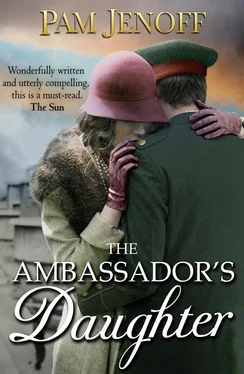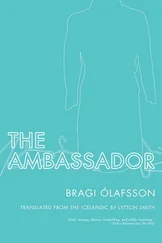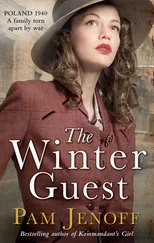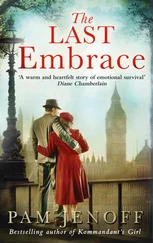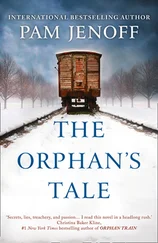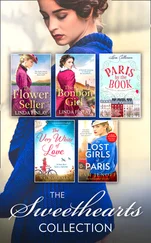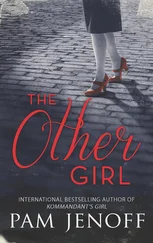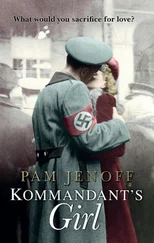Outside, I scan the line of cars and find ours. There is a dampness to the frosty night air that I can almost taste. As I get in, I see Krysia walking from the hotel with her parents. She kisses them each on the cheek and starts in the other direction, her blue cape radiant in the sea of black. I watch as she slips away, quiet as a cat, then ducks into the alleyway before reaching the boulevard.
Where is she going alone at night? It is after ten and there is still a curfew. I climb from the car once more. “I’ll make my own way,” I say to the driver, shutting the door before he can protest.
I weave my way through the departing crowd, breaking free and turning down the alleyway where I last saw Krysia. The street is dark and I fear that I have lost her, but I hear footsteps ahead and quicken my pace. A moment later the passageway opens onto a wide avenue and Krysia appears in a yellow pool of streetlight. She moves swiftly, almost seeming to fly beneath the billowing cape. I struggle to stay back far enough so as not to be noticed.
Krysia reaches the corner and stops. Then she turns, facing me before I have time to hide. “You again!” I freeze, an animal trapped. “Are you following me?”
“No—” I protest too quickly.
“I was joking, of course. You’re staying in the area?”
“My hotel is nearby, but I am going to visit some friends.” I regret the lie as soon as I have spoken, the notion that I would be calling on anyone at this hour of the night hardly plausible.
She does not respond but continues walking, shrugging her shoulders in a way that suggests I am welcome to join her. We travel wordlessly along the rue Royale, the swish of her cape giving off a faint hint of lilac perfume.
“Did you come to Paris before the war?” I ask, hoping she will not mind conversation. My breath rises in tiny puffs of frost.
“Yes. There was not so much work for pianists in southern Poland.” She unfurls detail a bit at a time, like a kite string, or thread off a spool. “When the war broke out I found myself stranded here.” There is something deeper beneath the surface, a longing in her voice that belies a part of the story she is not willing to share with me. “But I miss home terribly. Do you?”
“I suppose.” I have not until just this moment thought about it. Our town house in Berlin’s Jewish quarter is not large—even as a child, I could touch both walls of my bedroom at the same time if I stretched my arms out sideways. But it is cozy and made beautiful by all of my mother’s decorations, the floral trim and slipcovers that Papa never would have thought to do himself and that he has left untouched since she died. There’s a tiny garden with a fountain in the back, a park down the road for strolling. It’s been years since we’ve actually lived there for any period of time, though. “We’ve been abroad for so long. Now home is wherever Papa and I land with a place to lay our heads and books to read.”
She smiles. “The vagabond lifestyle.” We reach the steps of the metro, a dark cavernous hole I’ve passed before but never entered. Krysia stops. “Your friends,” she says suddenly. For a moment I am confused. She is referring to my alibi for being out walking, the fact that we’ve long since left the neighborhood I purported to be visiting. “You really were following me.” It is not a question.
“I just …” I falter.
“What is it that you want from me?”
I try to come up with another excuse and then decide to be honest. “Company. I’m bored,” I say, my voice dangerously close to a whine.
Krysia arches an eyebrow. “Bored, in Paris?”
My statement must sound ludicrous. “Not with the city, exactly. It’s all of the parties and silly gossip.”
“So don’t go. Play your own game. No good can come from idleness. Come.”
The metro steps are damp and slick and I take care not to fall as I follow her down. Below, my senses are assaulted by the dank odor of garbage and waste. I avert my eyes from a pair of rats scurrying along the tracks, fighting the urge to yelp. The ground rumbles beneath our feet and a long wooden train rolls into the station, looking not unlike the trolley cars that travel the streets above. The car we board is empty but for an old man sleeping at the other end. It begins to move swiftly through the darkness. I try to act normal, as though accustomed to this strange mode of travel.
“I saw you at the arrival parade for Wilson,” I say, unable to hold back. Krysia stares vaguely over my shoulder and for a minute I doubt my memory, wondering if the woman at the parade had been someone else. “You left in the middle,” I press. The statement comes out abrupt and intrusive.
“I had somewhere to be.” She does not elaborate.
Two stops later the doors open and I follow Krysia back up onto the street, breathing in the fresh air deeply to clear the dankness from my lungs. We are on the Left Bank now, with its narrow, winding streets. This is Paris as I knew it as a girl, buildings leaning close, whispering secrets to one another. Parisians, still in the habit of conserving from the war, have shuttered and darkened their houses and only every other streetlight splutters in an attempt to save electricity. A low fog has rolled in from the river now, swirling eerily around us.
A few minutes later, we reach the boulevard du Montparnasse. The wide avenue is as bright as midday, light spilling forth from beneath the café awnings. A door to a café opens and a woman’s high tinkling laugh cascades over the music. La Closerie des Lilas reads the painted sign on the glass window of the café, smaller print advertising the billiards and rooms available on the floors above.
I follow Krysia inside, where she weaves through a maze of tables without waiting to be seated, steering toward the high mahogany bar with red leather stools. Shelves filled with bottles climb to the ceiling of the mirrored wall behind it. The room is warm and close, plumed with clouds of cigarette smoke. Ragtime music from an unseen gramophone plays lively in the background, mixing with boisterous conversation in French, German and a handful of other languages.
Behind the bar, a skinny brown-haired boy, eighteen or nineteen maybe, with coal-black eyes, stacks beer steins. Feeling his gaze follow me, I flush. I’m still not used to the kind of attention young women receive in Paris, so much more admiring and less veiled than in London or Berlin.
We reach an alcove behind the bar, not quite set off enough from the main part of the café to be its own room, a few tables with an odd assortment of chairs thrown haphazardly around them. A half-decorated Christmas tree lists in the corner.
Krysia pulls up two chairs to one of the tables, where a handful of men are gathered. I await the introductions that do not come, then sit down beside her. The marble table is littered with overflowing ashtrays and empty wine bottles and an untouched carafe of still water. Two candles in a brass dish burn at the center, melting together in a molten pool. The only woman, Krysia looks out of place in this group of rough men. But she chats easily, as if among family. The gathering crackles with conversation. Across from me two men are debating how the war will be remembered in the literature, while to my left there is a lively discussion about the future of Palestine. Ideas rise like champagne bubbles around me and I struggle to keep up, to grasp one before it is displaced by the next
“Is Marcin coming?” one of the men asks in accented French. His sideburns, wide and deep, lash onto his cheeks like daggers. He wears a red silk scarf around his neck, knotted jauntily.
Krysia shakes her head. “He’s playing a wedding at Chartres.”
The man snorts. “That’s a disgrace.”
Читать дальше
